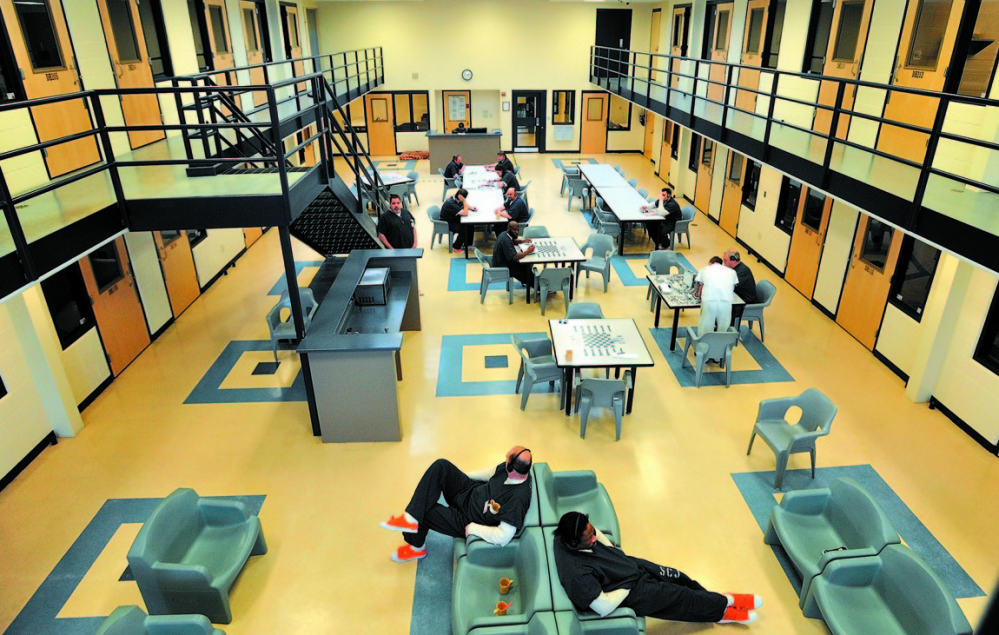SKOWHEGAN — Somerset County’s taxpayers are the ones who will pay the price for Thursday’s Maine Supreme Judicial Court ruling that Somerset County improperly used revenue from boarding federal prisoners in 2013 to pay down its jail debt, the county administrator said Friday.
“This case has been about protecting the Somerset County taxpayers, and I’m disappointed that the justices didn’t see it that way,” County Administrator Dawn DiBlasi said Friday. “Somerset continues to be the second-poorest county in the state and the third-largest county, with a population of approximately 52,000. This decision took money right out of their pockets.”
While the county felt the biggest financial hit three years ago when it didn’t get the money it thought it was owed, winning the decision and getting the money now would have been a big help to the still-struggling county budget.
In a 4-1 decision, the court ruled against the county, stating that the Maine Board of Corrections had the authority to hold the county’s third quarter payment in 2013 because the county had taken in more federal money than expected and used it to pay down debt on the construction of the jail in East Madison.
The Board of Corrections said the extra money should have gone to the board for dispersal throughout the entire 15-jail corrections system. For that, the board reduced the amount of Somerset County’s corrections funding by withholding the third quarter payment in the amount of $280,442, and the county filed suit.
The board, which has since been disbanded, also withheld the county’s fourth quarter payment, bringing the total amount the county thought it was owed to $560,884.
“The impact (of not getting the money) back in 2013 was huge,” DiBlasi said Friday of the intended tax relief for county taxpayers. “But now, because the law has changed since then, it’s not going to change much for anybody today. The deficit was in 2013 and we managed to limp through that, but there will be no tax relief going forward if it remains the same.”
She said the state’s withholding of money from the county forced one of the four pods at the jail to close and 17 job vacancies to remain unfilled “so we could operate in the black.”
The fourth pod remains closed because the county does not have the money to reopen it, she said.
Thursday’s ruling vacates an earlier decision by Maine Supreme Court Justice Donald Alexander, who presided over the case in Superior Court in Skowhegan. The Board of Corrections appealed the ruling to the state’s highest court, which released its decision Thursday.
Alexander, who recused himself from the appeal, had ruled it was legal for Somerset County to use revenue from boarding federal prisoners to pay off debt.
Lawyer Mike Hodgens represented the county in the case. DiBlasi said the county’s lawyer, Peter Marchesi, of Waterville, is out of the country this week and will pick the case back up when he returns. She said she hopes Marchesi will file a motion to reconsider the Supreme Court’s decision.
DiBlasi said the county previously received about $1.1 million from the State Investment Fund and $300,000 from the Community Corrections Act, 20 percent of which was to be used for programs to combat recidivism.
Now, she said, with state budget cuts, the county receives a flat $700,000 to cover corrections — 30 percent of which has to be earmarked for inmate recidivism programs.
DiBlasi said the county was punished for being frugal and smart with its surplus money by paying off debt on the jail, which opened in 2009.
“Their decision continues to punish the taxpayers for being responsible enough to build a jail when the old jail became obsolete,” she said.
Newell Graf, chairman of the county commissioners, would not comment on the case Friday.
“I respectfully but vehemently disagree with the Maine Law Court’s decision on this matter,” said Somerset County Sheriff Dale Lancaster, whose department oversees jail operations. Lancaster said that when Alexander ruled in the county’s favor in Superior Court and when the dissenting judge of the Law Court’s decision, Justice Andrew Mead, wrote his opinion, they understood the complexities of this case.
“There was never any statutory authority for the state Board of Corrections to factor federal revenue into the state’s operational fund distribution to county jails,” Lancaster said. “Federal revenue was an independent revenue source outside the purview of the BOC.”
Lancaster said the state had “grossly underfunded county jail operations,” and the Board of Corrections saw the federal revenue as a funding stream to augment the state’s lack of funding.
“I think it is a travesty that the taxpayers of Somerset County are being negatively affected by this decision,” he said. “We were not frivolously spending the money. We used it to put back into jail operations, capital, and pay down debt service, money that saved the Somerset County taxpayer.”
The state Board of Corrections was abolished in July, as was the State Investment Fund, which distributed quarterly payments to the jails. The state Department of Corrections therefore “became the proper entity in this financial dispute to stand in the Board’s shoes,” the judges said in the 32-page decision. Thursday’s ruling also makes moot a companion case filed by Somerset County seeking the fiscal 2012-13 forth quarter payment.
On July 31, 2012, the BOC approved payments for the first two quarters of fiscal 2012-13. When the second quarter ended, Somerset County already had received federal prisoner boarding revenue that “substantially exceeded” revenue the county had expected to receive. In January 2013 county commissioners voted to use all revenue from boarding federal inmates for operations and debt service at the county jail and not share the money with the state. The resolution was retroactive to July 1, 2012, the starting date of the 2012-13 fiscal year.
“The county did not seek or obtain approval from the board for this disposition of surplus boarding revenue,” the justices wrote.
DiBlasi said she agrees with the dissenting opinion by Associate Justice Andrew Mead, who said that Somerset County built its jail before the creation of the Board of Corrections with the “clear intent” to recoup construction costs by housing federal inmates and the boarding capabilities of the jail “create a quasi-proprietary income-generating mechanism for the county.”
“Through the approach it took, the Board of Corrections overstepped its statutory authority and effectively appropriated these proprietary boarding fees,” Mead wrote.
DiBlasi said the county has been “holding our own” with the money it raises from taxes and receives from the state, plus the estimated $90 per day from the U.S. Marshals Service to board federal inmates.
Debt service on the jail is about $2.4 million annually on the original $30 million, 20-year bond. The jail’s operational budget is about $6 million annually, $4.8 million of which is from taxes. The rest is covered by state funding and federal boarders, which the county now is allowed to use.
Doug Harlow — 612-2367
Twitter:@Doug_Harlow
Copy the Story LinkSend questions/comments to the editors.





Success. Please wait for the page to reload. If the page does not reload within 5 seconds, please refresh the page.
Enter your email and password to access comments.
Hi, to comment on stories you must . This profile is in addition to your subscription and website login.
Already have a commenting profile? .
Invalid username/password.
Please check your email to confirm and complete your registration.
Only subscribers are eligible to post comments. Please subscribe or login first for digital access. Here’s why.
Use the form below to reset your password. When you've submitted your account email, we will send an email with a reset code.